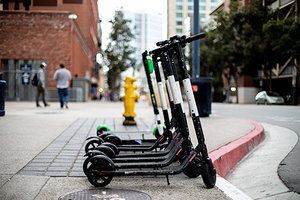New York's highest court of appeals has held that no-fault insurers cannot deny no-fault benefits where they unilaterally determine that a provider has committed misconduct based upon alleged fraudulent conduct. The Court held that this authority belongs solely to state regulators, specifically New York's Board of Regents, which oversees professional licensing and discipline. This follows a similar recent ruling in Florida reported in this publication.
E-Scooter Injuries: Who Will Pay?
Chiropractors are getting busier with e-scooter accidents. Many victims are badly injured. In 2018, with the rise of companies like Bird and Lime, the U.S. saw more than 1,500 injuries or deaths related to electric scooters according to a study by Consumer Reports,1 and that's just the ones we know about.
At this point, thousands of e-scooters have been dropped in nearly 100 U.S. cities ... and the injuries continue to rise. Trauma surgeons all across the country are reporting scooter accidents on a daily basis that range from minor abrasions and lacerations to fatalities.
As you might expect, these accidents come in many flavors: scooter vs. vehicle, scooter vs. pedestrian, scooter vs. pavement – even scooter vs. dog in some cases. And as this mode of transportation gets more and more popular, particularly among young riders who often have never ridden an electric scooter before or who fail to wear a helmet, we can expect tens of thousands of injuries arising from electric scooter accidents, which represents tens of thousands of potential new patients for chiropractors who specialize in trauma.
Treating on Lien: Beware!

From a personal-injury standpoint, however, this can be tricky. Depending on who is at fault for the accident, there may be little or no insurance to pay your bill. For this reason, it is important that you get some information from your new patient before you agree to treat on lien (even if your patient has already retained counsel).
Scenario #1: Rider at Fault
If a scooter rider hits a pedestrian or falls of their own negligence, the rider's homeowner's or renter's insurance may cover their medical damages up to a point; however, this is not always the case and younger riders may not have any such insurance. This is by far the most common of type of scooter accident and, unfortunately for PI DCs and attorneys alike, it is the least likely to yield a good PI case.
Not to worry; this is going to be a cash patient for you. (This is the same situation if a pedestrian is at fault for causing a scooter rider to fall and sustain injury.)
Scenario #2: Driver at Fault
If an automobile hits someone on a scooter, you can pretty safely expect the driver's car insurance will cover the injury (assuming the driver was at fault). As always, look to the PI attorney for guidance.
Scenario #3: Scooter Company at Fault
If the scooter company is to blame, such as if the scooter malfunctions or is negligently maintained, your patient may be out of luck for now. Companies like Bird and Lime have taken the position that their user agreements (which riders are required to agree to before they can rent a scooter) disclaim all damage to the rider. Thus, these companies must be held harmless in the event of injury.
These agreements are fundamentally unfair, as they are almost never actually read and seem to shift the burden of ensuring the scooters are safe onto the rider (who is often in no position to assess such things), rather than taking responsibility for the products these companies are placing onto our roads.
As litigation against these companies continues, we can expect to see changes in the way in which claims of personal injury against scooter companies are handled, in much the same way Uber and Lyft had to figure out how to handle such problems as they grew.
Scenario #4: City or Private-Property Owner at Fault
If a city or owner of private property is responsible (such as if a rider falls due to a pothole or other defect in property), the property owner may be liable and whatever insurance is held on that land will likely cover such damage (again, look to the PI attorney for guidance here). The problem, again, is that cities are getting wise to the "hold harmless" user agreement loophole. Some cities (such as Santa Monica, Calif.) are requiring that scooter companies operating within the city include language in their user agreement that effectively releases cities and city employees from liability.
The Bottom Line
Electric scooters are likely here to stay as more and more commuters begin using them to solve the age-old "last mile" problem. However, with the increase in their use will assuredly come an increase in the already-high number of accidents resulting from such use.
Chiropractors should obviously welcome the opportunity to introduce a new generation of Americans to chiropractic care, but should be wary of doing so on a lien basis without knowing first where the insurance money is coming from.
Reference
- Felton R. "E-Scooter Ride-Share Industry Leaves Injuries and Angered Cities in Its Path." Consumer Reports, Feb. 6, 2019.



